This article was originally published in the March/April 2022 Issue of the WatchTime print magazine.
With the latest version from 2021, Omega continues to offer an attractive reinterpretation of its first true dive watch from 1957, but has also incorporated some unexpected changes, especially when compared to its direct predecessor from 2014. WatchTime takes a closer look at the new Seamaster 300 Co-Axial Master Chronometer.
Design
For our test, Omega provided a stainless-steel model with blue dial and matching dive bezel insert (Ref. 234.30.41.21.03.001) — a rather attractive combination that was previously only available in platinum, bicolor or titanium, with the latter costing about a third more than the stainless-steel version with black dial. Given the model’s vintage appeal (and blue dials continuing to be extremely popular), we’re glad this option is now available in stainless steel and feel it made sense to not use the high-tech metal here, even though this means buyers currently don’t have a lightweight option and would have to opt for the slightly larger Diver 300m Co-Axial Master Chronometer “007 Edition” (Ref. 210.90.42.20.01.001) instead.
The basic design of the watches from 2021 and 2014, as well as the original model from 1957, are very similar (see the overview photo following). At second glance, however, some differences become clear. The new watch comes with only the logo and the historical “Seamaster 300” lettering on the dial; the second hand ends in a luminous “lolipop” dot instead of an arrow, a feature that was already used for the highly popular “Spectre” limited edition from 2015 (Ref. 233.32.41.21.01.001); and the numerical hour markers 3, 6, 9 and 12 are now also beige-brown, like the triangular hour markers, rather than silver-colored (and often mistaken for white). This is primarily due to the new dial design. In 2014, the triangles were recessed and filled with vintage-style luminous material, often described as “faux patina” (or “fauxtina”). Now, Omega is using a sandwich dial with a luminous-coated base plate and a perforated top layer with cutouts for the numerical hours. As usual, most displays glow blue in the dark, but the minute hand and corresponding zero point on the rotating dive bezel stand out in green.
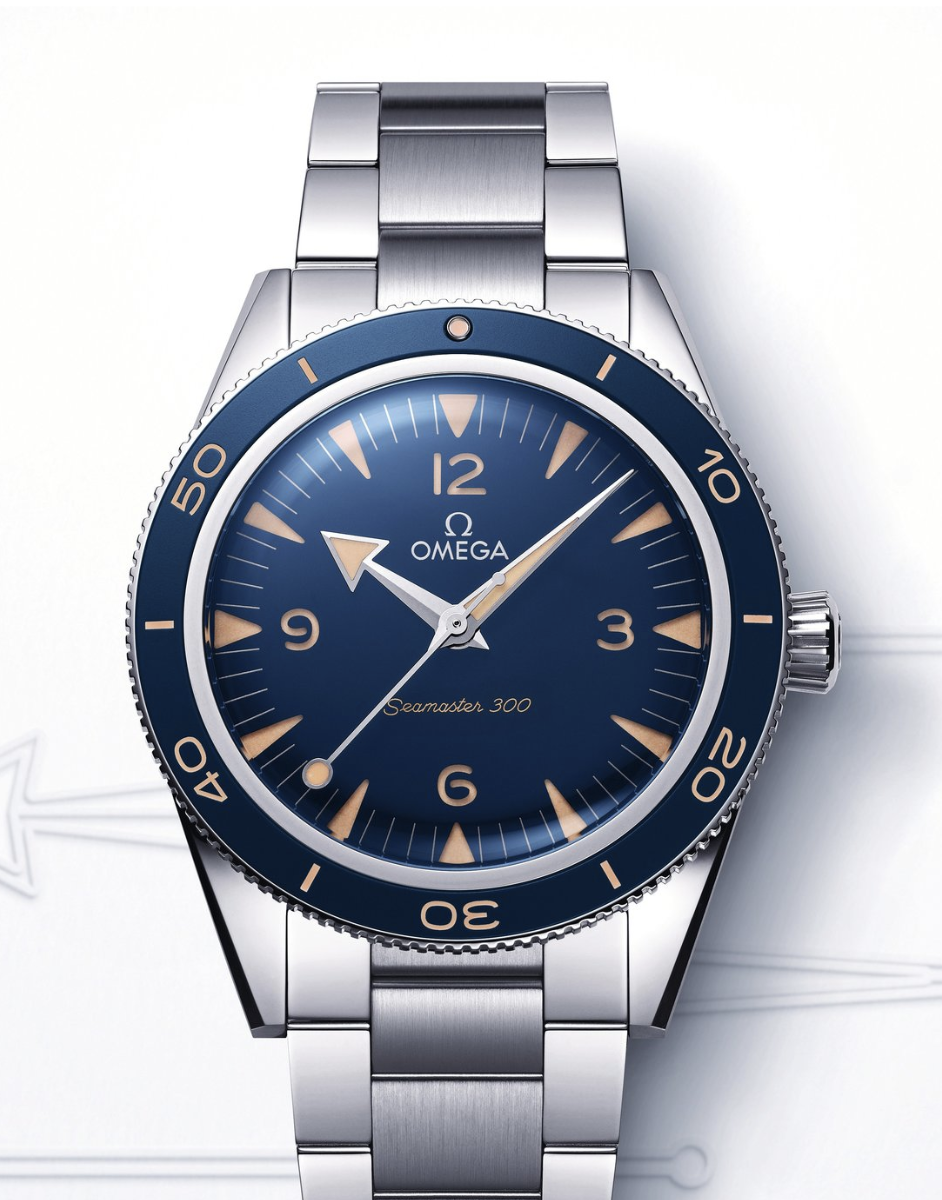
The bezel track is also coated with luminous material throughout. In addition to the luminous dot, the earlier model had silver numerals made of Liquidmetal alloy. Back then, the base material for the bezel was ceramic; today it is aluminum. We see the advantage of the new model in the more uniform color scheme and greater luminosity of the displays. The disadvantage here is less scratch resistance of the dive bezel than before.
The screw-down crown, which ensures the water resistance to 300 meters noted in the watch’s name, is slightly smaller on the new model, but its conical shape makes it just as ergonomic as the cylindrical crown of its predecessor. As before, it can still be used in the halfway pulled-out position for moving the hour hand forward or back, which is useful when crossing time zones or switching from daylight saving time to standard time. A stop-seconds mechanism ensures accuracy whenever setting the time anew. This now-commonplace technology stops the seconds hand whenever the crown is pulled out completely.
Bracelet
Omega has also modified the details of the bracelet. Like so many other retro-look models coming out of Biel, the bracelet tapers toward the clasp. In addition, the product designers switched the polished and matte surfaces so that now, as in 1957, the polished surfaces are on the outer links. The visual effect is stunning. The entire watch looks more elegant thanks to the tapered bracelet with outer polished links. That’s the advantage. The disadvantage? The outer links are more exposed than the inner links which, like the bezel, increases the susceptibility to scratches. But it should be noted that in our wearing test, over a period of several weeks, hardly any scratches were left on the bracelet or on the bezel.

The well-made clasp is virtually unchanged. The sturdy folding clasp is secure and easy to use thanks to its one-sided opening structure and two deployant buttons. A huge advantage: inside, there’s a patented quick extension piece with three locking levels that can be operated with a push-button slider to adjust the length. For example, you can lengthen the bracelet by one or two 1.9-mm increments for greater comfort on a hot day. This is less than the six increments that were offered by the previous model, so be very careful during the initial sizing of the bracelet. There are whole and half links to ensure comfort, so after some trial and error, you’re certain to find the right length.
A sturdy pin inside the links is held in place by screws on both sides of the bracelet. Omega also holds a patent for this high-end detail. After proper adjustment of the length of the bracelet, the Seamaster 300 is very comfortable to wear from morning to night.
Movement
The sapphire crystal caseback no longer has a smooth round edge but a wavelike grooved edge, which can be found on most Seamaster models today. The large transparent window offers a view of the precise, individually decorated, antimagnetic components that make up the automatic, in-house 8912 caliber. This movement is structurally identical to the Caliber 8400 used in the 2014 generation and also evaluated by Switzerland’s Federal Institute of Metrology
(METAS). The technical advantages have all remained; the rotor winds in both directions and provides an above-average power reserve of 60 hours. The silicon hairspring can ensure an extremely accurate rate even when exposed to temperature fluctuations or impacts. The balance wheel is mounted beneath a bridge for better stability and security than a single-sided balance cock; four poising weights for fine adjustment allow it to “breathe” freely. And last but not least, Omega’s own co-axial escapement with multilevel pallets and escape wheel provides consistent impulse transmission for even greater rate accuracy.
All of the structural advantages of the in-house movements prompted Omega to go beyond the rate test conducted by the official Swiss chronometer agency COSC, and the company began submitting its watches to the testing agency METAS for additional certification. The fully assembled timepieces are tested for functional reliability, rate stability, water resistance, power reserve and resistance to extreme magnetic fields of up to 15,000 gauss.

A watch that passes all these tests is certified by METAS as a Master Chronometer. Due to the considerable number of timepieces Omega produces, the testing agency has a subsidiary in the Omega building in Biel. The independence of the tests, as verified contractually by both partners, is guaranteed at all times.
And our test watch? It conforms to the promise of the high quality standards, both on the timing machine and on the wrist. The electronic test showed a gain of 4.2 seconds per day, but only 2 seconds when worn on the wrist. The individual positions were only 4 seconds apart, which is even more difficult to attain than a small average deviation.
This Seamaster 300 movement offers the same advantages as the previous generation, even though the above-average performance of the movement and the entire cased watch is officially certified by METAS, which inspired Omega to offer a five-year warranty for its Master Chronometer.
Dive Properties
In our test, the watch proved itself to be high quality, durable, precise, easy to use and comfortable to wear. One drawback, however, needs to be mentioned. The bezel — which is easy to grasp — extends beyond the edges of the case for ease of use, but this may cause it to shift out of place when you reach into your pocket or put your arm through your backpack strap. In our wearing test, not a day went by without the rotating bezel moving unintentionally. For those who actually plan to use a $6,500 watch as a backup instrument while diving, Omega unquestionably offers more suitable options in the Seamaster range. The Seamaster 300 Co-Axial Master Chronometer tested here is ideal for water sports, but not necessarily suited for diving. Same with the stainless-steel bracelet: the extension isn’t long enough to go over a dive suit (an extra-long textile strap can be purchased separately).
The bezel track without minute markers also indicates that Omega’s intention here was rather to create a harmonious retro design and not necessarily a rugged tool watch. Therefore, all in all, the Seamaster 300 is more advisable for everyday wear or recreational sports, as well as for festive occasions — anywhere it can show off its advantages to the fullest.

New Beats Old?
Is the new generation of the Seamaster 300 better than the old? Consider the fully luminous bezel track, the more harmonious color array with uniform beige-brown displays, a more elegant bracelet, the METAS certificate, plus a five-year guarantee and a new stainless-steel version in blue. There are counterarguments, but they’re fewer in number: the bezel is more susceptible to scratches, the clasp has a shorter quick-adjustment length, and the “lollipop” seconds hand might not be to everyone’s taste (we preferred the arrow-tipped hand, which was also used on other Omega models like the Moonwatch, and it fulfills its function as a safety control while diving almost as well as does the large lollipop hand). Overall, the subtle design updates on the new Seamaster 300 have resulted in a more balanced and refined appearance, and the technology, functionality, execution and finishing on the watch leave little to wish for. In short, the generational shift has been successful in every respect.
Omega Seamaster 300 Specs:
Manufacturer: Omega S.A., Stämpflistrasse 96, 2504 Biel/Bienne, Switzerland
Reference number: 234.30.41.21.03.001
Functions: Hours, minutes, seconds
Movement: In-house movement 8912 with antimagnetic components, automatic, chronometer, 25,200 vph, 38 jewels, stop-seconds, quick-adjust hour setting mechanism, coaxial escapement with silicon hairspring and DLC-coated titanium balance wheel, fine adjustment with regulating screws, two serially arranged barrels, Nivachoc shock absorber, 60-hour power reserve, diameter = 29 mm, height = 5.5 mm
Case: Stainless steel, aluminum bezel, domed sapphire crystal with inner antireflective coating, screw-down crown, fully threaded caseback with sapphire crystal viewing window, water resistant to 300 m
Bracelet and clasp: Stainless-steel bracelet with simple safety folding clasp and incremental extension piece, up to 3.8 mm
Rate results: Deviation in seconds per 24 hours
Dimensions: Diameter = 41 mm, height = 13.85 mm, weight = 143 g
Variations: With black dial and bezel (Ref. 234.30.41.21.01.001, $6,500), with Bronze Gold case (Ref. 234.92.41.21.10.001, $11,600)
Price: $6,500
Scores:
Bracelet and clasp (max. 10 points): The bracelet links are securely fastened with screws and surfaces are carefully finished. The safety folding clasp with incremental extension piece is sturdy, functional and attractive. 9
Case (10): High water resistance, flawless finishing, two sapphire crystals; the aluminum bezel is not scratch-resistant. 8
Dial and hands (10): Nicely finished “sandwich” dial and hands; all displays glow in the dark. 8
Design (15): Harmonious, sporty/elegant retro design; the lollipop second hand may not appeal to everyone. 13
Legibility (5): Scales and hand lengths and luminescence are good overall, but the domed sapphire crystal is highly reflective. In the dark, the abundance of glowing markers, numerals and the minute hand, which only shines at the tip, are confusing. For historical reasons, the bezel has no minute markers. 3
Operation (5): Ergonomically shaped crown, grooved bezel, stop-seconds mechanism, quick adjustment for the hour hand, but the bezel may shift unintentionally. 4
Wearing comfort (5): Thanks to the extension piece, the watch is always comfortable on the wrist; hair does not get pinched or pulled. 5
Movement (20): The individually decorated, antimagnetic movement runs with chronometer-certified accuracy thanks to the free-sprung silicon hairspring and co-axial escapement, and both long and consistently thanks to two barrels; superior. 19
Rate results (10): Average daily gain and maximum deviation are low, at 4 seconds per day; gain of only 2 seconds per day on the wrist. 9
Overall value (10): Appropriately priced for the brand and the quality of the watch. 8
TOTAL: 86 points
To learn more about Omega, click here, and to subscribe to the WatchTime print magazine, click here.

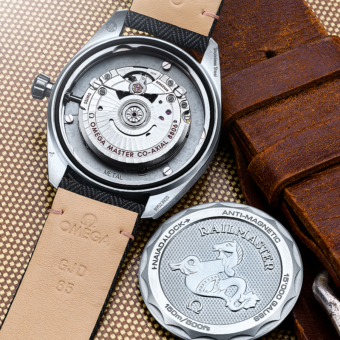
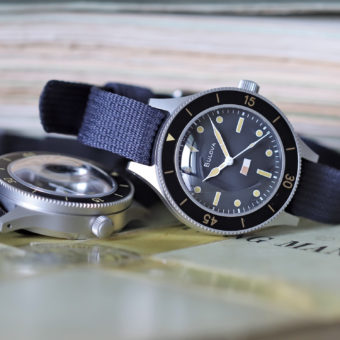
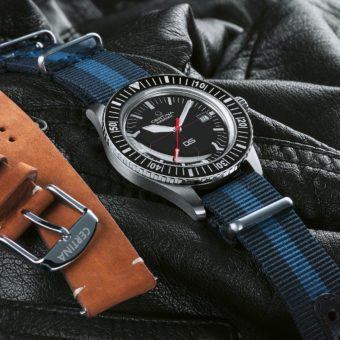
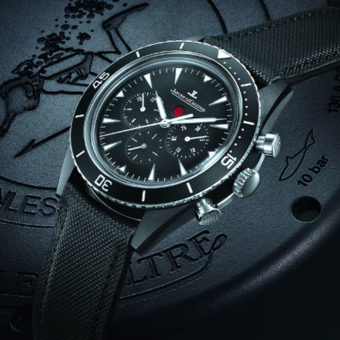
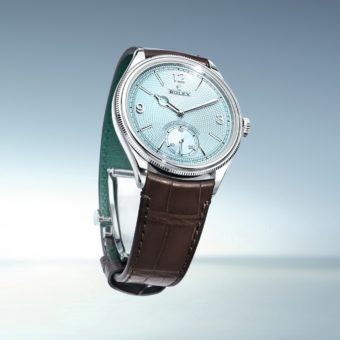
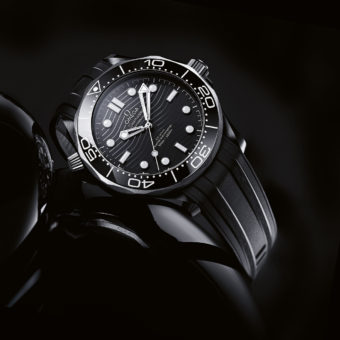
Nice Divers watch that shows the basic need for a diver, but I did not read anything about its luminosity. We must not forget the need for night diving and being able to see everything clearly on a diver’s watch. Unfortunately, the bezel should be tighter to move to prevent accidental movement (which is very important).